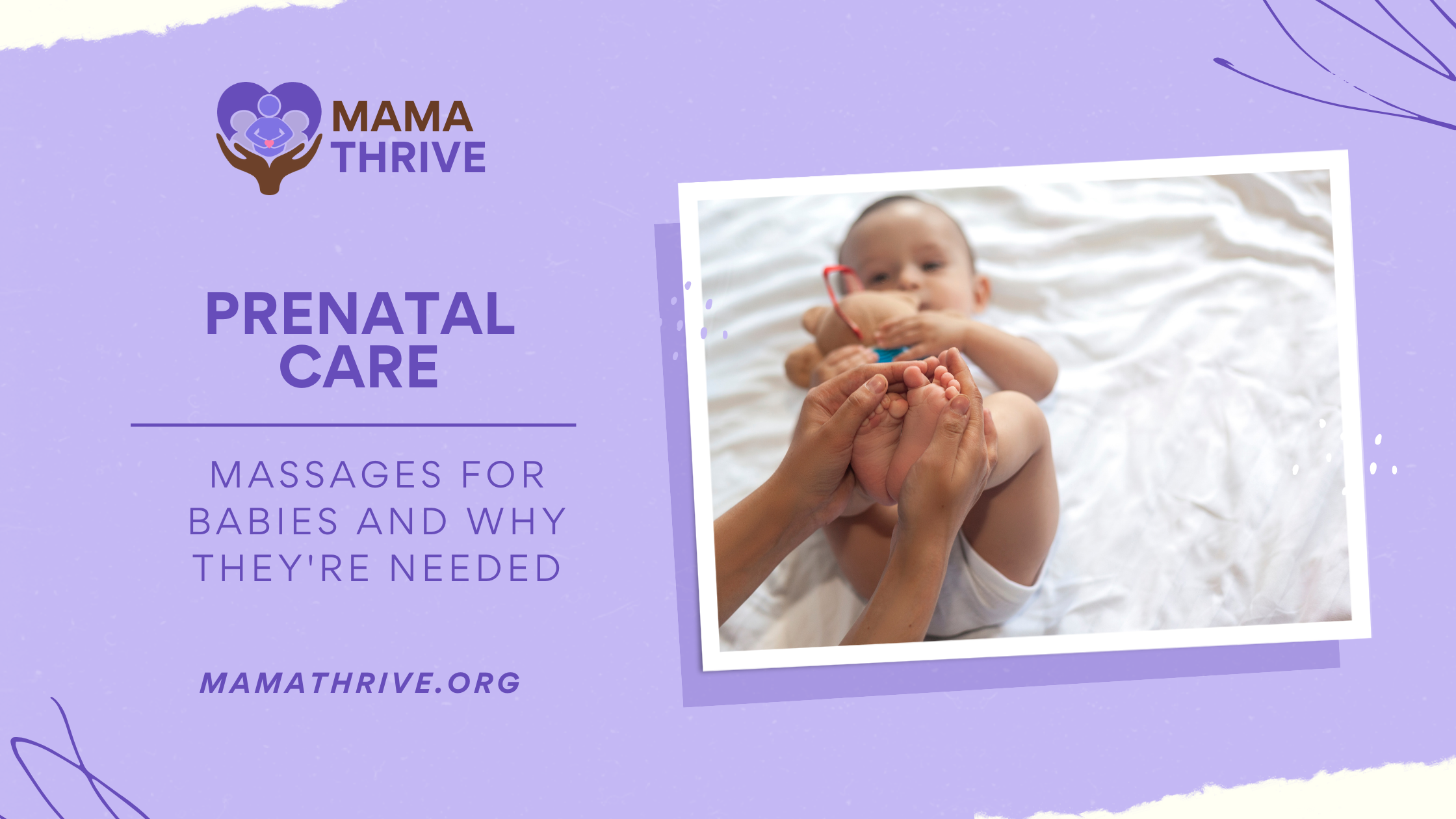Prenatal care is vital for monitoring the health of the mother and the developing fetus. According to the World Health Organization, prenatal care can significantly reduce maternal deaths by identifying and managing complications and high-risk conditions. Statistics show that women who receive prenatal care have a 25% lower risk of preterm delivery and a 20% reduction in the risk of low birth weight in infants, highlighting the importance of early and regular prenatal consultations.
Prenatal care, an essential aspect of a healthy pregnancy, encompasses various practices aimed at ensuring the well-being of both the mother and the unborn child. Among these practices, baby massages stand out as a crucial yet often overlooked component. This article delves into the importance of massages for babies, supported by statistics and information that underline their significance in prenatal care.
Different Massages for Babies
Massages for babies encompass the gentle manipulation of a baby’s muscles and joints through various techniques of rubbing and stroking. This practice transcends mere physical touch, serving as a profound means of communication that nurtures an emotional connection between parents and their babies.
1. Swedish Massage for Babies
Objective: To relax muscle tension and improve blood circulation, promoting relaxation and sleep.
How to Perform
- Create a calm environment. Ensure the room is warm and softly lit.
- Lay your baby on a soft, comfortable surface on their back.
- Start with the legs. Use long, gentle strokes from the thigh down to the foot, alternating between hands. This area is less sensitive and helps your baby get used to the sensation of massage.
- Move to the arms with the same long strokes, from the shoulders down to the wrists.
- Gently massage the chest and belly with your palms, making broad, circular motions.
- Finish with the back, turning your baby onto their belly if they’re comfortable. Apply gentle pressure with your fingers in a downward motion along the spine, avoiding direct pressure on the spine itself.
2. Reflexology for Babies
Objective: To soothe digestive issues, colic, and teething discomfort by applying pressure to specific points on the feet and hands.
How to Perform
I. Digestion and Colic Relief:
- Locate the area slightly below the center of the foot pad, which corresponds to the stomach.
- Gently press and rub this area in a circular motion for 1-2 minutes.
- For colic, gently press the arch of the foot, which corresponds to the intestinal area.
II. Teething Discomfort:
- Gently rub the tips of the toes, which correspond to the head and teeth areas, to relieve discomfort.

3. Indian Massage (Shantala)
Objective: To calm the baby, improve sleep patterns, and enhance overall well-being through rhythmic strokes.
How to Perform
- Sit on the floor with your legs stretched out in front of you and lay your baby on your legs, facing you.
- Start with the legs, holding one leg at the thigh and gently but firmly massaging in a downward motion towards the feet. Repeat several times before switching to the other leg.
- Use both hands to massage the baby’s arms from shoulders to wrists.
- Place your hands on your baby’s chest and gently massage outward towards the shoulders.
- Turn your baby on their belly and perform gentle strokes along their back from shoulders to buttocks.
4. Craniosacral Therapy for Babies
Objective: To alleviate tensions in the body through subtle manipulations of the skull and sacrum, beneficial for babies who have experienced birth trauma.
How to Perform: Due to the specialized nature of craniosacral therapy, it’s recommended to seek a trained therapist. However, gentle head stroking can be soothing.
Gentle Head Stroking: With your baby lying comfortably on their back, use your fingertips to gently stroke from the top of the head down towards the neck. This motion should be very light and soothing, aiming to calm rather than stimulate.
Tips for All Massage Types
- Always observe your baby’s reactions. If they seem uncomfortable or distressed, consider trying a different technique or stopping the massage.
- Use a baby-friendly, edible oil if desired, such as coconut or olive oil, to reduce friction.
- Engage with your baby through gentle talk and eye contact during the massage to enhance the bonding experience.
Learn more about babies sleep patterns.
Why Massages for Babies are Important
Baby massages are an ancient practice that has found a significant place in modern childcare, recommended by pediatricians and healthcare professionals worldwide. This practice is not merely a luxury but a necessity for the holistic development of infants. Let’s explore the reasons why baby massages are indispensable, supported by compelling statistics and research findings.
1. Promotes Better Sleep Patterns
A well-rested baby is a happy baby, and massages play a pivotal role in ensuring quality sleep. Infants who received regular massages before bedtime fell asleep more quickly and achieved a deeper, more restful sleep than those who did not. Massages help in regulating the circadian rhythms, which is crucial for setting a natural sleep-wake cycle. This regulation is particularly beneficial in the early development stages, ensuring that babies adapt to regular sleep patterns that contribute to their overall health and well-being.
2. Aids in Digestion and Relieves Colic
Digestive discomfort can cause significant distress in infants, leading to colic symptoms characterized by prolonged periods of crying. Research shows that gentle abdominal massages can effectively stimulate the digestive system, facilitating the release of gas and easing bowel movements. A systematic review highlighted in the International Journal of Nursing Studies found that infants who received abdominal massages experienced a significant reduction in colic symptoms, including less frequent crying episodes and decreased discomfort.
3. Enhances Growth and Development
Growth and development are primary concerns in infancy, and massages have been proven to positively influence these aspects. According to studies, preterm newborns who underwent regular massage therapy showed a 47% higher weight gain per day compared to those who did not receive massages. Moreover, these massaged infants were observed to have significantly improved motor behavior and were discharged from the hospital earlier than their counterparts, highlighting the role of touch in accelerating developmental milestones.
4. Supports Emotional Bonding
The emotional bond between a parent and their baby is foundational to the infant’s emotional and social development. Massages serve as a powerful tool for enhancing this bond. Mothers who engaged in regular baby massage sessions reported lower levels of postpartum depression and established a stronger emotional connection with their babies. This bonding not only supports the emotional health of the mother but also contributes to the baby’s sense of security and well-being.
5. Boosts Immune System
A robust immune system is vital for fighting off infections and diseases. Massages contribute to enhancing a baby’s immune response by increasing the activity of natural killer cells. These cells play a crucial role in the body’s defense mechanism against pathogens. The study observed that infants who received massages showed a marked improvement in the functioning of their immune system, demonstrating fewer instances of illnesses and infections compared to those who did not receive massages.
Conclusion
Massages for babies are a vital part of prenatal care that offers extensive benefits for the baby’s physical and emotional development. These massages promote better sleep, aid in digestion, enhance growth, support emotional bonding, and boost the immune system. By incorporating baby massages into prenatal care, healthcare providers can offer a holistic approach to ensuring the well-being of both the mother and the child. As more parents and healthcare professionals recognize the importance of baby massages, they become an integral part of nurturing a healthy, happy baby.





